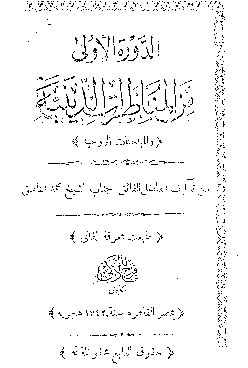
|
|
Abstract:
A reference to the Zoroastrian text Dinkird, or "Acts of the Religion" (dín-kird) in John Ferraby's All Things Made New, and on the authenticity of the Zoroastrian scriptures.
Notes:
Original transmitted by email.
|
|
MEMORANDUM To: Universal House of Justice From: Research Department The Research Department has studied the email message of 7 January 1999 to the Universal House of Justice from Mr. xxxx. Mr. xxxx states that he recently found on a Bahá'í Web site a quotation from the Hand of the Cause of God John Ferraby's All Things Made New.1 The source of the quotation is given as "Dínkird", which he takes to be the same as "Denkard" or "Dinkard", that is, a "Zoroastrian encyclopedia of the 9th century, A.D., rather than a work of Zoroaster". He has tried to find this quotation in a Web version of the 1896 translation of the Denkard but has not found anything resembling it. He asks whether the Research Department is aware of "any Zoroastrian text identical to or similar to" the quotation in question. As he has been unable to gain access to a copy of Mr. Ferraby's book, he also asks whether the quotation appears in all of the editions. Source of the Quotation in All Things Made New The text in question is the following: When a thousand two hundred and some years have passed from the inception of the religion of the Arabian and the overthrow of the Kingdom of Irán and the degradation of the followers of My religion, a descendant of the Iranian kings will be raised up as a prophet.2 As Mr. xxxx is aware, the only source provided for this quotation in All Things Made New is "Dinkird",3 which is translated as "Acts of the Religion". He is correct that the Denkard is a 9th century compilation of the preserved Zoroastrian scriptural materials, and summaries and commentaries on the contents of the Avesta. It is written in Middle Persian using the Pahlavi script. With regard to his comment that, in the Web version, the first 65 chapters of Book III were missing, we note that according to the Encyclopedia Iranica, the Denkard was originally divided into nine volumes of unequal importance, but the first two and the beginning of the third have been lost.4 The Research Department has neither the time nor the resources to attempt to identify the specific text in the Denkard which is the source of the quotation in question. This is a project for future Bahá'í scholars. However, it is interesting to note that in Muhammad Nátiq's Al-Munázarátu'd-Díníyyah, there are quoted two passages which, if combined, appear to provide a similar text.5 These two passages are referenced to the Denkard, but unfortunately no additional identifying information is provided (see photocopy of the relevant page attached). Regarding whether the quotation in question appears in all of the editions of Mr. Ferraby's book, it does appear in each of the three editions, as follows: First Edition, 1957, page 171. Authenticity of Zoroastrian Scripture As Mr. xxxx suggests, we do not consider authoritative the Zoroastrian scripture to which we have access today. In a letter dated 22 June 1943, written on behalf of the Guardian to an individual, we read: In the Bahá'í teachings it states that all the Prophets have foretold a Promised One Who is Bahá'u'lláh. We cannot be sure of the authenticity, word for word, of any of the past Holy Scriptures except the Qur'án, as they were either not written down during the Prophet's lifetime or have been changed in the course of time and the originals lost; what we can be sure of is that when Bahá'u'lláh or the Master stated that Zoroaster foretold a Promised One's coming, it is correct. The Zoroastrians have no way of contradicting this assertion, as they themselves know their scriptures are not in the original form, and therefore not absolutely authentic. According to scholars of the subject, of all the Zoroastrian scripture presently known, only the Gathas, 17 hymns which have been preserved in the ancient language spoken by Zoroaster, are attributable to Him. Attachment [see photocopies below]
[The following photocopied pages were included in the letter; the marks in the margin indicate the passages in question. Click on images for larger versions.] 
 |
| METADATA | |
| Views | 14786 views since posted 1999; last edit 2025-03-06 07:42 UTC; previous at archive.org.../uhj_zoroastrianism_dinkird; URLs changed in 2010, see archive.org.../bahai-library.org |
| Language | English |
| Permission | recipient (of letter) |
| History | Scanned 1999 by Ralph Wagner. |
| Share | Shortlink: bahai-library.com/1262 Citation: ris/1262 |
|
|
|
|
Home
search Author Adv. search Links |
|